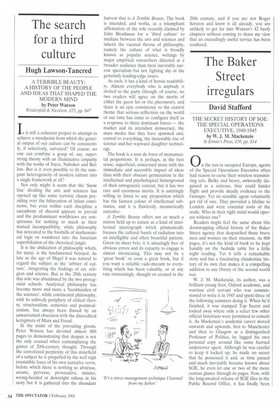The search for a third culture
Hugh Lawson-Tancred
A TERRIBLE BEAUTY: A HISTORY OF THE PEOPLE AND IDEAS THAT SHAPED THE MODERN MIND by Peter Watson
Weidenfeld & Nicolson, 125, pp. 847
Is it still a coherent project to attempt to achieve a standpoint from which the general output of our culture can be consistently, if selectively, surveyed? Of course, no one can combine a grasp of, say, superstring theory with an illuminative empathy with the works of Joyce, Nabokov and Bellow. But is it even possible to fit the rampant heterogeneity of modern culture into a single framework at all?
Not only might it seem that the 'Snow line' dividing the arts and sciences has opened up like some tectonic chasm presiding over the bifurcation of infant continents, but even within each discipline a cacophony of discord appears to prevail and the predominant worldviews are conspicuous for nothing so much as their mutual incompatibility, while philosophy has retreated to the foothills of mathematical logic or wandered into the luxuriant superfoliation of the rhetorical jungle.
It is the abdication of philosophy which, for many, is the fundamental betrayal. As late as the age of Hegel it was natural to regard the subject as the 'arbiter of culture', integrating the findings of art, religion and science. But in the 20th century this role was abandoned by the two protagonist schools. Analytical philosophy has become more and more a 'handmaiden of the sciences', while continental philosophy, with its unlovely periphery of critical theory, structuralism, semiotics and postmodernism, has always been flawed by an unwarranted obsession with the discredited kerygmata of Marx and Freud.
In the midst of the prevailing gloom, Peter Watson has devoted almost 800 pages to demonstrating that despair is not the only counsel when contemplating the gamut of 20th-century thought. Through the convoluted perplexity of this minefield of a subject he is propelled by the well nigh irresistible force of his own narrative verve, before which there is nothing so abstruse, arcane, perverse, provocative, sinister, wrong-headed or downright odious in his story but it is gathered into the abundant
harvest that is A Terrible Beauty. The book is intended, and works, as a triumphant affirmation of the role recently claimed by John Brockman for a 'third culture' to mediate between the arts and sciences and inherit the vacated throne of philosophy, namely the culture of what is broadly known as popular science, writings by major empirical researchers directed at a broader audience than their inevitably narrow specialism but not fighting shy of the genuinely leading-edge issues.
As such, it has a kind of heroic readability. Almost everybody who is anybody is invited to the party (though, of course, no two readers will agree on the merits of either the guest list or the placement), and there is an epic consistency to the central theme that serious reflection on the world of our time has come to configure itself as a response to three dominant forces — the market and its attendant democracy, the mass media that they have spawned and, central to everything, the inexorable rise of science and her wayward daughter technology.
The book is a tour de force of monumental proportions. It is perhaps, in the best sense, superficial, concerned more with the immediate and accessible impact of ideas than with their obscure germination in the intellectual and psychological hinterground of their ontogenetic context, but it has two rare and enormous merits. It is untiringly willing to listen to any proposition which has the faintest colour of intellectual substance, and it is flawlessly, mesmerically narrative.
A Terrible Beauty offers not so much a mirror held up to nature as a kind of intellectual spectograph which prismatically focuses the cultural bands of radiation into an intelligible and often beautiful pattern. Given its sheer brio, it is amazingly free of obvious errors and its capacity to engage is almost intoxicating. This may not be a 'great book' or even a great book, but if you want a reliable vade-mecum to everything which has been valuably, or at any rate interestingly, thought or created in the 20th century, and if you are not Roger Scruton and know it all already, you are unlikely to get far into Watson's 42 beefy chapters without coming to share my view that an exceedingly useful service has been rendered.


























































 Previous page
Previous page